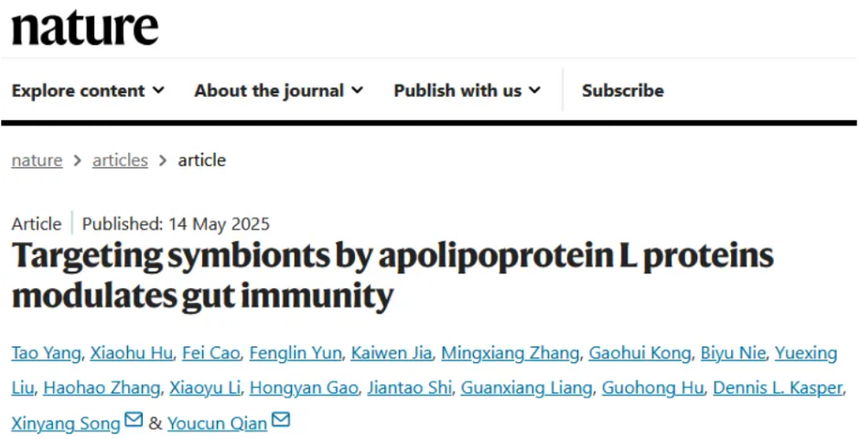Please click the button below to go to our email login page
|
After 11 years of baton-passing research with two suspensions, a team of academic “brothers” has finally achieved a significant breakthrough.Recently, the internationally top-level academic journal Nature has published a paper titled “Targeting symbionts by apolipoprotein L proteins modulates gut immunity”. This study firstly unveils that members of the apolipoprotein L family, secreted by intestinal epithelial cells, selectively recognize the ceramide-1-phosphate (Cer1P) molecule found on symbiote Bacteroides, and initiates a cascade of multi-cellular interactions, which are essential for maintaining immune homeostasis in the gut mucosa. Tao Yang is the paper’s first author. The corresponding authors are Youcun Qian, a researcher in Shanghai Institute of Nutrition and Health, and Xinyang Song, a researcher in Center for Excellence in Molecular Cell Science, Chinese Academy of Sciences.
However, as the first author, Tao Yang faced many difficulties and obstacles during research. Previously, he found in another study that the development of natural intraepithelial lymphocytes in the small intestine of mice is influenced by the diet-derived nucleic acids, and is independent of the intestinal microbiota. With thorough preparations, as the team was about to submit, they occasionally discovered that the same work had been scooped by another Chinese lab. What’s worse is a string of rejections from Nature, Science, Cell, Nature Immunology, etc. Despite the rejections, they persist in resubmission. Only at the end of 2024, the paper has finally been published in Nature Communications, bringing the saga to a rather “muted” close.
There were also thistles and thorns in the way of conducting this study. With two suspensions within 11 years and experimental supplementation in an extreme time before acceptance, he received preliminary acceptance from Nature until early March, 2025. At that time, a verse flashed in his mind, “Mountains and rivers seem to have no way out, but there is another village behind the bright flowers and dark willows”. He waited for this email for 11 years.
“The first paper in the research career is pivotal. If you can publish a good paper during graduate studies, the road ahead tends to be a bit smoother,” Tao Yang said with a laugh. “My first two papers were both full of twists and turns. “Late-bloomer” is probably the kindest way to describe them.”
After 6 years of graduate school and 5 years of doctoral studies, Tao Yang noticed some classmates grew up to become independent PI, while others spent ten years of their youth without any results and had no choice but to switch careers.
What supports his persistence is the power of role models around him-there are many people like him who have been working hard on a paper for seven or eight years, as well as the scientific research interests he has established since his youth.
In 1991, Tao Yang was born into a rural family in Wuhu City, Anhui Province. While his fellow villagers were frolicking and playing, Tao Yang was more willing to swim in the ocean of knowledge. In high school, influenced by his biology teacher at the time, Tao Yang made up his mind to take the biology major in the future. Afterwards, he studied for his undergraduate degree in the Science Experimental Class at China Agricultural University and joint 320 Courtyard for scientific research. During his undergraduate studies, he and his roommates often audited lectures at universities and research institutes in Beijing, and often talked about interesting scientific issues. After pursuing a master's degree, the senior colleagues in the laboratory are full of enthusiasm for scientific research. When chatting, the topic unconsciously turns to the latest literature and possible research directions.
Tao Yang repeatedly emphasized that taking the full advantage of the youth is of great importance for scientific research because creativity in youth is extremely precious. The more content a person accumulates in scientific research, the more likely they are to be bound by inherent thinking.
In the future, his team on immunology and disease will conduct research regarding how gut microbiota affects immunity and aging, and explore the underlying mechanisms. At the same time, they will continue to investigate the function of human APOL2 protein and accordingly develop some clinically feasible innovative therapies, continuously injecting new momentum into nutrition and health on the new journey of accelerating the seizing of the technological high ground in the field of major chronic disease prevention and elderly health promotion. |

